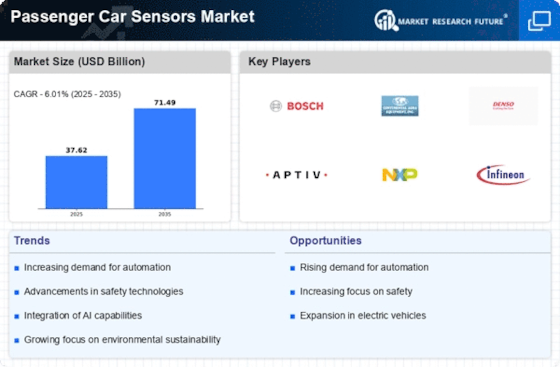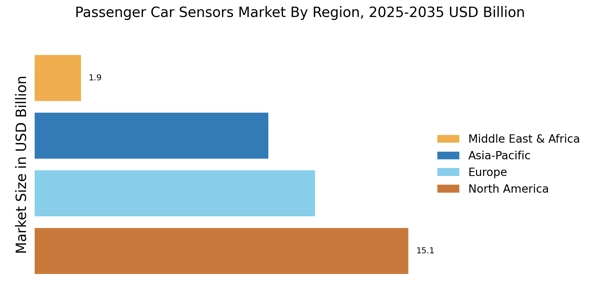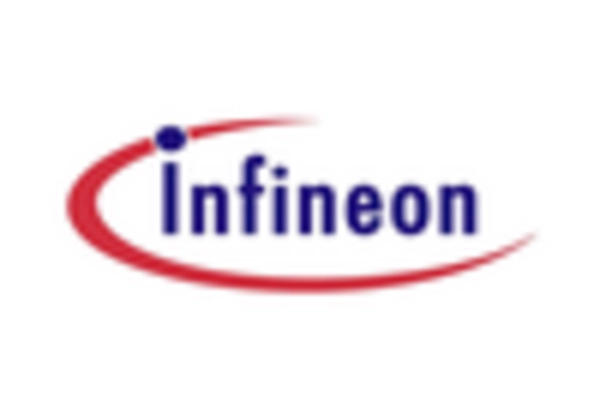Increase in Vehicle Electrification
The shift towards electric vehicles (EVs) is significantly impacting the Passenger Car Sensors Market. As more consumers opt for electric vehicles, the need for specialized sensors that monitor battery performance, energy consumption, and regenerative braking systems becomes paramount. The integration of these sensors is essential for optimizing the efficiency and safety of electric vehicles. Market analysts suggest that the electrification trend could lead to a substantial increase in sensor demand, with estimates indicating a growth rate of around 14% in the coming years. This trend underscores the importance of adapting sensor technologies to meet the evolving needs of the automotive market.
Expansion of Connected Vehicle Technologies
The proliferation of connected vehicle technologies is reshaping the Passenger Car Sensors Market. As vehicles become increasingly interconnected, the demand for sensors that facilitate communication between vehicles and infrastructure is on the rise. These sensors play a critical role in enabling features such as vehicle-to-vehicle (V2V) and vehicle-to-infrastructure (V2I) communication, which enhance traffic management and safety. The market for connected vehicle sensors is projected to grow at a CAGR of approximately 11% over the next several years, driven by advancements in communication technologies and consumer demand for smarter, more efficient transportation solutions. This trend highlights the necessity for innovative sensor applications in the automotive sector.
Growing Environmental Concerns and Regulations
The rising awareness of environmental issues and stringent regulations regarding emissions are influencing the Passenger Car Sensors Market. Governments are increasingly mandating the incorporation of sensors that monitor vehicle emissions and fuel efficiency. This regulatory landscape encourages manufacturers to adopt advanced sensor technologies that can provide real-time data on vehicle performance and environmental impact. The market for sensors that support eco-friendly driving practices is anticipated to grow, with projections indicating a potential increase of 12% in demand over the next few years. This shift not only aligns with global sustainability goals but also enhances the appeal of vehicles equipped with such technologies.
Technological Advancements in Sensor Technologies
Technological innovations in sensor technologies are transforming the Passenger Car Sensors Market. The development of more accurate, reliable, and cost-effective sensors is enabling manufacturers to integrate advanced functionalities into vehicles. For instance, the advent of LiDAR and radar sensors has improved object detection and distance measurement capabilities, which are crucial for autonomous driving applications. Furthermore, the miniaturization of sensors allows for their integration into various vehicle components without compromising performance. As a result, the market is expected to expand, with sensor technology advancements potentially leading to a market size increase of approximately 15% over the next five years. This trend indicates a robust future for the Passenger Car Sensors Market.
Rising Demand for Advanced Driver Assistance Systems
The increasing emphasis on safety and convenience in the automotive sector drives the demand for advanced driver assistance systems (ADAS). These systems utilize various sensors to enhance vehicle safety, thereby reducing accidents and improving overall driving experience. The Passenger Car Sensors Market is witnessing a surge in the adoption of technologies such as lane departure warning, adaptive cruise control, and automatic emergency braking. According to recent estimates, the market for ADAS is projected to grow significantly, with a compound annual growth rate (CAGR) of over 10% in the coming years. This growth is largely attributed to consumer preferences for vehicles equipped with enhanced safety features, which in turn propels the demand for sophisticated sensor technologies.
.png)
















